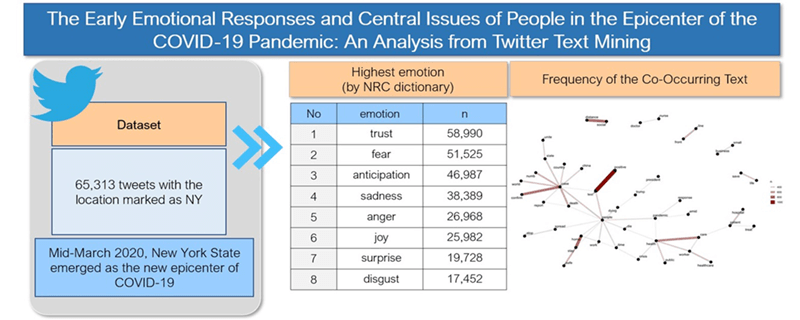 Open Access
Open Access
ARTICLE
The Early Emotional Responses and Central Issues of People in the Epicenter of the COVID-19 Pandemic: An Analysis from Twitter Text Mining
1 Department of Nursing, Kyungin Women’s University, Incheon, 21041, South Korea
2 Red Cross College of Nursing, Chung-Ang University, Seoul, 06974, South Korea
* Corresponding Author: Yun-Jung Choi. Email:
International Journal of Mental Health Promotion 2023, 25(1), 21-29. https://doi.org/10.32604/ijmhp.2022.022641
Received 18 March 2022; Accepted 28 September 2022; Issue published 29 November 2022
Abstract
This study aimed to explore citizens’ emotional responses and issues of interest in the context of the coronavirus disease 2019 (COVID-19) pandemic. The dataset comprised 65,313 tweets with the location marked as New York State. The data collection period was four days of tweets when New York City imposed a lockdown order due to an increase in confirmed cases. Data analysis was performed using R Studio. The emotional responses in tweets were analyzed using the Bing and NRC (National Research Council Canada) dictionaries. The tweets’ central issue was identified by Text Network Analysis. When tweets were classified as either positive or negative, the negative sentiment was higher. Using the NRC dictionary, eight emotional classifications were devised: “trust,” “fear,” “anticipation,” “sadness,” “anger,” “joy,” “surprise,” and “disgust.” These results indicated that citizens showed negative and trusting emotional reactions in the early days of the pandemic. Moreover, citizens showed a strong interest in overcoming and coping with other people such as social solidarity. Citizens were concerned about the confirmation of COVID-19 infection status and death. Efforts should be made to ensure citizens’ psychological stability by promptly informing them of the status of infectious disease management and the route of infection.Graphic Abstract

Keywords
Cite This Article
 Copyright © 2023 The Author(s). Published by Tech Science Press.
Copyright © 2023 The Author(s). Published by Tech Science Press.This work is licensed under a Creative Commons Attribution 4.0 International License , which permits unrestricted use, distribution, and reproduction in any medium, provided the original work is properly cited.


 Submit a Paper
Submit a Paper Propose a Special lssue
Propose a Special lssue View Full Text
View Full Text Download PDF
Download PDF Downloads
Downloads
 Citation Tools
Citation Tools